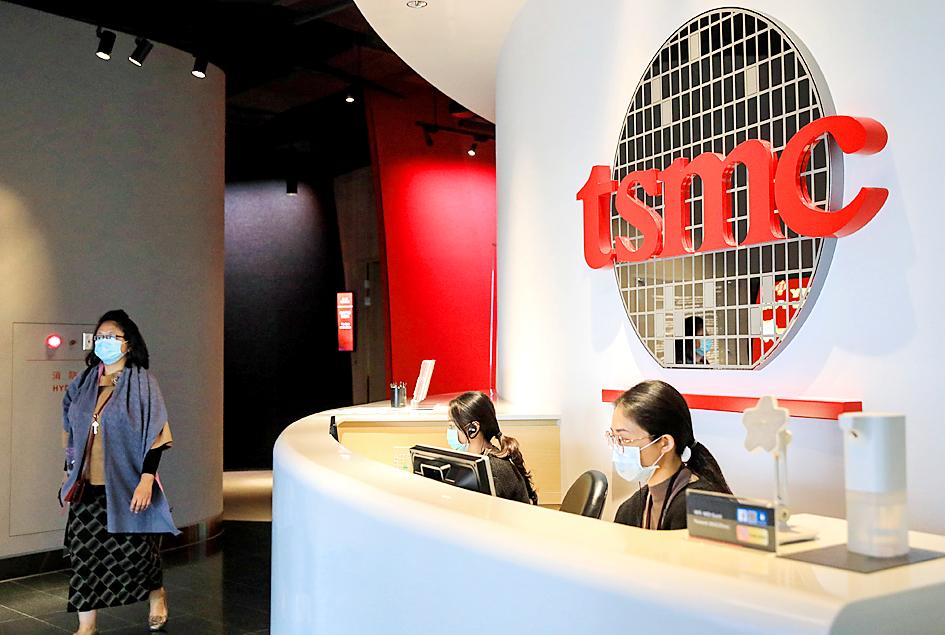Taiwan Semiconductor Manufacturing Co (TSMC, 台積電) is planning to boost this year’s capital expenditure budget by about 46 percent to exceed US$44 billion, citing strong customer demand for advanced technologies used in high-performance computing (HPC) and 5G-related applications, the world’s largest contract chipmaker said yesterday.
The plan marks a record spending for TSMC after the chipmaker budgeted US$30 billion for capacity expansions at home and overseas fabs last year.
TSMC is planning to allocate about 80 percent of this year’s capital spending for advanced chip capacity expansion including 2-nanometer, 3-nanometer, 5-nanometer and 7-nanometer technologies.

Photo: I-Hwa Cheng, Bloomberg
The chipmaker reiterated that it is on track to ramp up 3-nanometer production in the second half of this year, dismissing speculation about a delay.
The chipmaker is seeing more customer interest in semiconductors using 3-nanometer technology than 5-nanometer chips, the most advanced chips available currently.
“We expect 2022 to be another strong growth” period, TSMC chief executive officer C.C. Wei (魏哲家) told a quarterly investors’ teleconference yesterday.
“We are confident we can outperform foundry [sector] growth,” he said, setting a growth target of 25 to 29 percent.
The chipmaker would this year benefit from “a structural increase in demand fueled by HPC, accelerated digitalization and short-term chip supply imbalance because of COVID-19 and geopolitical tensions,” Wei said.
The revenue forecast factored in that one of its customers, an integrated device manufacturer linked to Intel Corp, is “insourcing” production after re-entering the foundry sector, TSMC said.
The chipmaker expects its capacity to remain tight through this year, given the increased use of chips in vehicles, PCs, servers, networking devices and smartphones.
Forecasting robust growth momentum, the chipmaker expects customer prepayment to pick up this year, after it last year received prepayments totaling US$6.7 billion.
TSMC expects the growth momentum to extend into the next few years, with revenue to expand at an annual compound growth rate of 15 to 20 percent.
HPC applications would grow at the fastest pace with robust demand for CPU, GPU and artificial intelligence accelerators, the chipmaker said.
TSMC raised its forecast for gross margin over the next few years to above 53 percent from 50 percent forecast earlier.
This quarter, gross margin would improve to 53 to 55 percent from 52.7 percent last quarter, it said.
Revenue is to expand more than 7 percent to US$16.6 billion to US$17.2 billion from the previous quarter, beating Goldman Sachs Group Inc’s forecast of a quarterly growth of 3.7 percent.
“Moving into the first quarter of 2022, we expect our business to be supported by HPC-related demand, continued recovery in the automotive segment and a milder smartphone seasonality than in recent years,” TSMC chief financial officer Wendell Huang (黃仁昭) said.
For the final quarter of last year, the chipmaker posted a profit increase of 16.4 percent to a record NT$166.23 billion (US$6.01 billion), compared with NT$142.77 billion a year earlier.
On a quarterly basis, net profit increased 6.4 percent from NT$156.26 billion, it said.
For the whole of last year, TSMC’s net profit rose about 15 percent to NT$596.54 billion from NT$517.89 billion in 2020.
Earnings per share were NT$23.01, up from NT$19.97 the previous year, it said.

NEW IDENTITY: Known for its software, India has expanded into hardware, with its semiconductor industry growing from US$38bn in 2023 to US$45bn to US$50bn India on Saturday inaugurated its first semiconductor assembly and test facility, a milestone in the government’s push to reduce dependence on foreign chipmakers and stake a claim in a sector dominated by China. Indian Prime Minister Narendra Modi opened US firm Micron Technology Inc’s semiconductor assembly, test and packaging unit in his home state of Gujarat, hailing the “dawn of a new era” for India’s technology ambitions. “When young Indians look back in the future, they will see this decade as the turning point in our tech future,” Modi told the event, which was broadcast on his YouTube channel. The plant would convert

‘SEISMIC SHIFT’: The researcher forecast there would be about 1.1 billion mobile shipments this year, down from 1.26 billion the prior year and erasing years of gains The global smartphone market is expected to contract 12.9 percent this year due to the unprecedented memorychip shortage, marking “a crisis like no other,” researcher International Data Corp (IDC) said. The new forecast, a dramatic revision down from earlier estimates, gives the latest accounting of the ongoing memory crunch that is affecting every corner of the electronics industry. The demand for advanced memory to power artificial intelligence (AI) tasks has drained global supply until well into next year and jeopardizes the business model of many smartphone makers. IDC forecast about 1.1 billion mobile shipments this year, down from 1.26 billion the prior

People stand in a Pokemon store in Tokyo on Thursday. One of the world highest-grossing franchises is celebrated its 30th anniversary yesterday.

Zimbabwe’s ban on raw lithium exports is forcing Chinese miners to rethink their strategy, speeding up plans to process the metal locally instead of shipping it to China’s vast rechargeable battery industry. The country is Africa’s largest lithium producer and has one of the world’s largest reserves, according to the US Geological Survey (USGS). Zimbabwe already banned the export of lithium ore in 2022 and last year announced it would halt exports of lithium concentrates from January next year. However, on Wednesday it imposed the ban with immediate effect, leaving unclear what the lithium mining sector would do in the